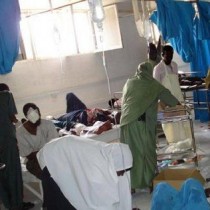
Somalia:Increasing challenges to delivering healthcare in Somalia put patients’ lives at risk
Nairobi(Sunatimes) Médecins Sans Frontières (MSF) is responding to increased medical needs throughout Somalia. However, providing medical care is becoming increasingly difficult, particularly in southern Somalia, where restrictions have been placed on receiving medical supplies and, in one case, supplies have been taken. These incidents are putting the lives of thousands of patients at risk. MSF is asking that its medical activities, staff, supplies and facilities be respected, so that the charity can continue to deliver free lifesaving healthcare.
Last month, a truck delivering therapeutic food to one of MSF’s hospitals was stopped by armed men and the contents taken. Despite repeated requests, the supplies were not returned. In the same month, MSF received notice that flights carrying essential medical materials to certain projects were banned from landing. "Our only option now is to resupply stocks by risky road transportation, which takes five to seven days to reach our remote projects in the south," explains Karin Fischer-Liddle, MSF’s head of mission in Somalia. This puts in jeopardy MSF’s vaccination campaigns for diseases such as measles, which use vaccines with time-sensitive ‘cold-chain’ delivery methods. In August, a team in one of MSF’s projects vaccinated as many as 3,360 children. "Our medical teams will no longer be able to respond to acute emergencies within 24 to 48 hours," says Fischer-Liddle. "Now, using trucks, it will take over a week. We urgently need to have air transport restored so as to prevent infectious diseases and to respond rapidly to emergencies."
MSF continues to be the biggest provider of free, high-quality medical care in Somalia. Last year, more than 1,300 Somali staff carried out nearly 650,000 consultations in MSF facilities, including 3,000 surgical operations. Presently, medical teams in Mogadishu are responding to an alarming rise in the number of war-wounded. In the Lower Juba Valley, the number of children suffering from malnutrition has been steadily climbing. . "We admitted more than 100 malnourished children in just two days," says Fischer-Liddle. Incidents that interrupt our resupply of medicines and other supplies can lead to unnecessary suffering and loss of life."
In some of MSF’s project sites, travel restrictions have been imposed on visits by specialist staff from outside Somalia, including doctors and nurses with particular technical skills, as well as logistical staff. As a medical organisation which aims to provide the highest standard of care, it is vital that key staff is able to continue making field visits to upgrade the skills and knowledge of MSF’s Somali staff. "There is a lack of medical technical assistance available in Somalia, so if we don’t have regular access to our field projects to train and assess our programmes, the quality of care and therefore our patients’ lives will suffer," says Fischer-Liddle.
Despite increasing obstacles, MSF continues to treat hundreds of people every day in ten locations of Somalia for violence-related injuries, diseases and malnutrition. MSF urges the authorities to take into account the critical medical needs of the Somali people by removing the restrictions and reducing the pressures that threaten MSF’s delivery of free, lifesaving medical care.
MSF’s assistance to Somalis:
MSF’s sole objective is to provide quality medical care.
MSF is a not-for-profit charity. In Somalia all funds come from the generous donations of the general public worldwide. MSF takes no funding or in-kind donations from any government or institution for its programmes in Somalia.
MSF runs its Somali programmes through more than 1,300 Somali staff supported by a small team of medical, logistical and managerial experts outside the country.
MSF works throughout Somalia in ten locations in eight regions: Jamame and Marere (Lower Juba valley), Dinsor (Bay), Dayniile (Banadir), Afgoye (Lower Shabelle), Jowhar, (Middle Shabelle), Beletweyne (Hiran), Guri El and Dhusamareb (Galgadud), and Galcayo (Mudug).
MSF provides free, comprehensive medical care, which includes surgery, tuberculosis treatment, nutrition, vaccinations, maternal and child health, and full in-patient and out-patient services.
###
By Ahmed Dahir Noor
Leave a comment
| Copyright © 2009 - 2025 Sunatimes News Agency All Rights Reserved. |
| Home | About Us | Diinta | Reports | Latest News | Featured Items | Articles | Suna Radio | Suna TV | Contact Us |
 0
0 









Somalia:Increasing challenges to delivering healthcare in Somalia put patients’ lives at risk
By Ahmed Dahir Noor